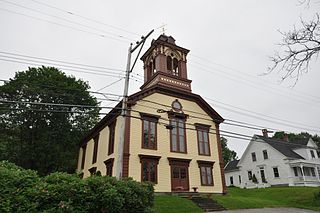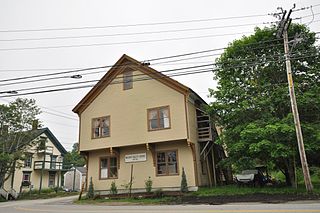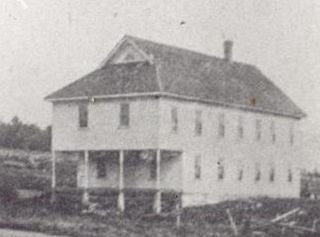
The Norfolk Grange Hall, previously known as First Baptist Church, is a historic Grange hall and former Baptist church at 28 Rockwood Road in Norfolk, Massachusetts. Built in 1863, it is one of the town's few surviving 19th-century civic buildings. Since 1921 it has been owned by the Norfolk Grange # 135 and used as its meeting hall. It was listed on the National Register of Historic Places in 1989.

Liberty Hall is the historic town hall of Machiasport, Maine. Located on Maine State Route 92 in the town's village center, it is a prominent local example of Italianate architecture, and has served as a civic and community meeting space for more than 100 years. It was built in 1873, and was added to the National Register of Historic Places in 1977.

Westport Town Hall is the current town hall of Westport, Maine. It is located on Main Road in a former Congregational church built in 1794. The building, used as the town hall since 1885, was listed on the National Register of Historic Places in 2002 as Union Meeting House, (Former) [sic].

The former Congregational Church of Medway, also known as the Wonder Grange, is a historic church building on Church Street in Medway, Maine. Built in 1874, it is a well-preserved vernacular interpretation of Italianate style. The privately owned building has most recently been used as a Grange hall. It was listed on the National Register of Historic Places in 1977.

The Tranquility Grange No. 344 is a historic Grange hall on Maine State Route 52 in Lincolnville, Maine. Built in 1908, it exhibits restrained Craftsman styling, and has been a social and civic center of the community since its construction. It was listed on the National Register of Historic Places in 2002.

The Former Machias Valley Grange, No. 360 is a social and civic meeting hall at 1 Elm Street in Machias, Maine. Built in 1907, it features a distinctive design that eliminates support posts in its dining hall and auditorium. Now owned by a local artists' cooperative, it continues to function as a social and civic meeting space. It was listed on the National Register of Historic Places in 2007.

The Monticello Grange No. 338 is a historic civic building on United States Route 1 in the heart of Monticello, Maine. Built in 1922 by the local Grange organization, it served the town for many years as its only performance space, hosting social events, town meetings, and school graduations, and is still used for some of these purposes. It was listed on the National Register of Historic Places in 2000.

The Oakfield Grange was an historic clubhouse and community meeting space at 89 Ridge Road in Oakfield, Maine. Built in 1906 by the local chapter of the Patrons of Husbandry, the building was for many years the sole social meeting space of any size in the small rural community. It was listed on the National Register of Historic Places in 2006. It has since been demolished.

The Enterprise Grange, No. 173 is a historic Grange hall at 446 Dow Road in Orrington, Maine. Built in 1884 and enlarged in the early 20th century, this modest Italianate building has been a significant social and civic center in the rural community since its construction. It was listed on the National Register of Historic Places in 2008.

The Pleasant River Grange No. 492 is a historic Grange hall on Round Island Road in Vinalhaven, Maine. Built as worker housing for a granite quarry, it was moved in 1909 to its present local for use by the local Grange chapter. It continues to be used by that organization as a community resource. It was listed on the National Register of Historic Places in 1999.

The Eaton School, in Norridgewock, Maine, also known as Somerset Grange #18, is a historic community building at Main Street and Mercer Road in Norridgewock, Maine. Originally built in 1866–67 to house a private academy and the local Masonic lodge, it is notable as an early design of Charles F. Douglas, a Maine native whose career began in Somerset County. The building is a fine local example of Second Empire design, and was listed on the National Register of Historic Places in 1988. It has been owned since 1916 by the local chapter of the Grange.

The Grasmere Schoolhouse No. 9 and Town Hall, also known as the Grasmere Grange Hall, is a historic municipal building located at 87 Center Street in the village of Grasmere in Goffstown, New Hampshire. Built in 1889 as a town hall and school, it has served a variety of civic and community functions since its construction, and is a good example of civic Queen Anne architecture. It was listed on the National Register of Historic Places in 1990.

The Former Upton Grange No. 404 is a historic former Grange hall on Maine State Route 26 in rural Upton, Maine. Built in 1899, this now-vacant wood frame building has seen a variety of commercial, civic and social uses. It was first used as a factory for the manufacture of spruce gum before being acquired by the local Grange chapter in 1911, and was used for social events as well as town meetings. It was listed on the National Register of Historic Places in 2000.

The former Bridgewater Town Hall and Jail are a pair of civic buildings on United States Route 1 in the center of Bridgewater, Maine. Built in 1894 and c. 1910 respectively, the buildings are the best-preserved and most architecturally distinguished of the community's surviving early civic structures. The town hall, in addition to its government functions, also hosted fraternal and social organizations, as well as community events. The buildings were listed on the National Register of Historic Places in 1990.

Holden Town Hall is a historic civic and community building at 723 Main Road in Holden, Maine. Built in 1873, it is an architecturally distinctive blend of styles. The building served as town hall into the 1960s, and as the local Grange hall until 1995. It was listed on the National Register of Historic Places in 2014.

The Waterboro Grange is a historic civic building at 31 West Road in Waterboro, Maine. Built in 1948-50, it is a simplified recreation of a 1920s Craftsman/Bungalow building that was destroyed by a massive wildfire that swept through the region in 1947, and is one of the last Grange halls built in the state. In addition to serving as home to the local Grange organization since then, it has been a major community resource, hosting all manner of social and civic functions. The building was listed on the National Register of Historic Places in 2012.

Cliffwood Hall, formerly Clifton Town Hall, is a historic municipal and social meeting hall at 15 Rebel Hill Road in Clifton, Maine. Built in 1892, it was for nearly 90 years the town's town hall, and one of its principal social meeting venues. It is now home to the Clifton Historical Society's museum collection and is known as the Clifton Town Hall Museum. The Society also operates the Harold Allan Schoolhouse.

The Harold Allan School is a historic school building at 15 Rebel Hill Road in Clifton, Maine. Built in 1863, it is the town's best-preserved surviving district-level one-room schoolhouse. It is now part of the local historical society's museum complex, which includes Cliffwood Hall, the town's former town hall. It was listed on the National Register of Historic Places in 2008.

The Danville Junction Grange is a historic Grange hall at 15 Grange Street in the Danville section of Auburn, Maine. It was built in 1898 for chapter 65 of the state Grange, and continues to be maintained by that organization as a public community resource. It was listed on the National Register of Historic Places in 2016.

The Starling Grange, now Starling Hall, is an historic former Grange hall at 2769 Main Street in Fayette, Maine, US. Built in 1879, it has been a fixture of the community since then. The Grange chapter disbanded in 1987, and the building has since then been owned by the town. It was listed on the National Register of Historic Places in 2016.














